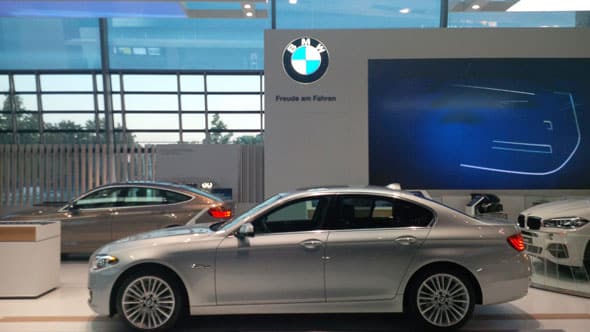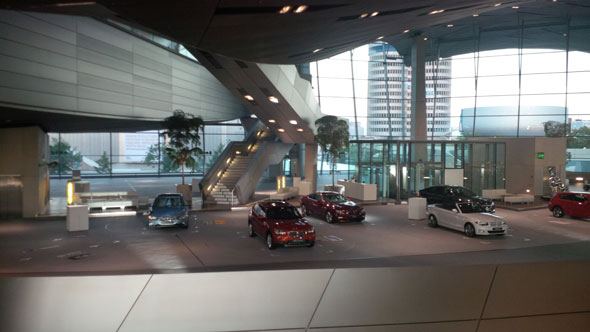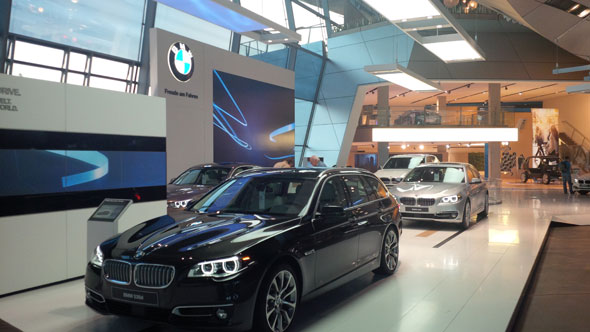In Defense of Germany’s Obsession with Cars

It was a German, Karl Benz, who invented the modern car. Germany hasn’t forgotten this fact. Virtually from the moment his wife Bertha took it on her famed 65 mile journey (without his knowledge), stopping on the way to buy petrol from a chemist, using her hatpin to clear a blocked fuel pipe, and her garter to insulate a wire, an intimate and passionate love affair with the car began in Germany.
There’s no other country I’ve been to where the car is held in almost spiritual regard as it is there. Let me explain what I mean. In the US or the UK, there are of course people who love cars, who visit motorshows and buy motoring magazines. But for most the car is primarily a means of transport. They can be pretty, exciting, lovely to look at, but ultimately they get you from A to B. It’s not at all uncommon to see cars that go unwashed for weeks or that have footwells filled with old sweet wrappers or newspapers.
Not so in Germany. I once read that when a German sees a dirty car, they assume the owner is either deliberately antisocial…or a foreigner. It never fails to amaze me (I lived there 12 years) how rapidly cars are washed after bad weather. Black cars, which attract the dirt so easily, seem to gleam all year round. This is no small feat given you’re prohibited by law to wash your car (or do other public work, such as mowing lawns or putting out laundry) on a Sunday in most parts of the country. Nor may you wash your car at home, because of environmental considerations. They have to be washed at special designated places.
The car is put on a special pedestal. Choosing and collecting a new one is a real experience. Most manufacturers have collection programmes: you visit the factory, have a tour where you stay in a hotel the night before, get brainwashed into brand loyalty with amazing marketing films that seem to emphasise the spiritual nature of the marque, get fed, and at the end of it collect your new car in a delivery room. I’ve done this myself 4 times now: the joy and excitement of everyone there is palpable, and impossible not to get caught up in. The fact it works as a marketing exercise is shown by my best friend accompanying me on one trip to collect my new Mercedes. He’s not “into” cars at all. Immediately on his return he ordered one from our local dealer, and we were back out in Bremen 3 months later collecting his new baby. They encourage children to come and have special information tours and workshops for them to get to work early on instilling a love of the brand.
These collection centres really are something else. BMW invested an estimated €500 million ($675 million) in the stunning “BMW World” building in Munich. Designed by a leading Austrian architect in the shape of a giant whirlwind, it is simply a glorified showroom and collection centre for customers from around the globe. If you’re from the US you can fly here, collect your new car, have a week to drive it in Europe, then it will be shipped back to your local dealer at home for you. The other German manufacturers all have similar programmes. If you’re a visitor to Munich, like the ACIS students below, simply jump in and try out all the cars: they actually encourage you to.
The high-tech VW “glass factory” in the centre of Dresden literally has glass walls so that the public can watch the miracle of car making from outside. I heard the place described as a modern-day German cathedral. The distinction is that people are not here to worship the Almighty, but instead it is a temple to the motor car. I once explained all this to the marketing director of Jaguar whom I happened to be sitting with at a dinner. He, a car person, sat there in slightly bemused fascination. The British just don’t do things this way. For plenty of Germans it’s not that much of an exaggeration to say the car is considered an additional member of the family. I remember my 65 year aunt getting very excited about the technical features of my car and the “new car smell” in a way that I’ve never experienced any British woman of her age doing. She knew what Distronic was for heaven’s sake. Do you!?
An interesting feature of cars sold in Germany, as opposed to elsewhere, is the lack of specification. A $150,000 top of the range model Mercedes has a sunroof, alarm, cup-holder ($30) and sat-nav as additional cost optional extras. Each new car is built to order, so it’s a cultural feature that people like to create a totally unique vehicle and select the specification to suit their needs. In the UK, and particularly more so in the US, we expect everything to be “thrown in”. It wasn’t so long ago that BMW, Audi and Mercedes didn’t even come with air-conditioning, a radio or electric windows as standard in Germany. In the 1980s the S-Class Mercedes had an exterior passenger mirror listed as an extra! Engines tend to be far smaller than in the US too, where V6 and V8 engines are offered in the same models where Germany also offers economical 4 cylinder diesels. Fuel costs of $8 a gallon (all deliberate government taxation) help explain that.
The German car industry is a huge employer, it’s successful, it exports around the world, and it invests masses of money in R&D. The mid-term revision of the E-Class Mercedes cost €1 billion for example. That’s not for the design of a brand new model: that’s investment in changing the features of an existing car. In France people might buy a French car out of patriotism. In Germany, if they choose a German car, it’s because they consider it to be the superior offering. If there’s a better option from Japan or elsewhere they will take it. They tend to buy German, however, because they think they’re the best available. The manufacturers take labour relationships as seriously as they do their design: one of VW’s 4 main strategic corporate goals is to have “the happiest workers in the industry”. VW does not email or phone any employee, of any level, outside work hours. Free-time is downtime. The philosophy is that happy workers make good cars.
The Autobahn is the symbol of the greatness of the car in Germany. Many people wrongly think the Nazis built the system. In fact they were started in the 1920s, but were greatly expanded during the Hitler time. By 1939 a network of freeways crossed the entire country, 20 years before Britain opened its first motorway. They remain “freeways” to this day (free of tolls for cars, and free of speed limits unless there is a specific reason to have one on a limited stretch). Most German manufacturers electronically limit their top models to 250kmh (155 mph) because this is considered fast enough for anyone reasonably to want to go. Porsche is the exception, and this is the one place you get to test their full capability legally on a public road.
All this said, you might think the “Car is King” in Germany. It is very much on one level – emotionally and “spiritually”. But unlike America, it is not King in terms of how people always choose to travel around the country. When Henry Ford produced the mass production car, he effectively killed off the growth of the passenger railway network and public transportation system more generally in the US. Everyone bought a car, and without one you’re stranded unless you happen to live in NYC for example.
In Germany, the growth in car ownership has been matched by development of and investment in public transport. This might seem like a contradiction in such a car worshipping society, but it isn’t. The Germans may love their cars like family members and keep them sparkling clean, but they’re not there solely to get around. If a train suits the job better for a particular journey, people go by train. Nor is the car the king of the road in built-up areas. Traffic calming measures, strictly enforced 30kmh (16 mph) limits, and encouragement to use the excellent bus networks in German cities are common-place. You’re allowed to drive at 250kmh on the Autobahn, but in urban areas you drive very slowly indeed. You also take your test at 18, which is a big difference to the US.
The car is worshipped by many in Germany, but it’s not simply a workhorse, if that makes sense. It’s more like a thoroughbred that’s well looked after, carefully stabled, and taken out when the circumstances befit it. You can even follow Bertha Benz’s route if you wish and see where it all began: since 2008 the “Bertha Benz Memorial Drive” has been signposted and is a major tourist draw. Repairing your car with a hatpin and garter are optional.
There we have it. VW’s motto in German is “Aus Liebe zum Automobil.” This translates as “Out of love for the car.” It summarises the relationship of many, if not all, Germans to their cars very aptly indeed.
Peter Ede is an ACIS tour manager from the UK. He has travelled to more than 60 countries and lived in 11 around the world. He is passionate about history, languages and sharing his love for Europe tours. He is particularly fond of Germany and Central Europe.














